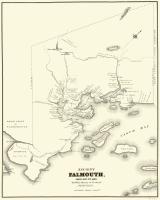
Map of New England and New York, ca. 1676
Largely an unexplored territory by European settlers, 17th century Maine mostly consisted of towns in present-day York County which had sworn their allegiance to the Massachusetts Bay Colony. Maine Historical Society
The story of the District of Maine's separation from Massachusetts began long before Congress approved its request for statehood 1820. It began in the early 17th century, when scattered, yet permanent, fishing settlements established themselves along the Maine coast. As early as November 1652, inhabitants of Kittery swore their allegiance to the government of Massachusetts Bay, and by 1658, Kittery, York, Saco, Wells and Cape Porpoise (Kennebunkport) had all submitted to Massachusetts authority.[1] As the population of the infant territory increased and altered over the next century, its political position, as well as its people increasingly homogenized with the parent colony, as Maine's economy, religion, and education were all intertwined with that of Massachusetts. However, this was not without some dissenting voices.
The relationship between Maine and Massachusetts was without sound footing from its infancy. In 1680, a petition from one hundred and eighteen inhabitants of Kittery, York, and Wells sought a separation from Massachusetts. The petitioners argued that Massachusetts officials obstructed their religious freedoms—an issue they believed could be alleviated by direct royal control. If granted, Maine's status would have been equal to Massachusetts within the colonial system.[2] Although unsuccessful, this is considered the first recorded attempt by Maine to separate from Massachusetts.

Map of Falmouth (present-day Portland) from 1630-1690
Maine Historical Society
The English Civil War (1642-1651) had ramifications on all American colonies. For Massachusetts specifically, England eventually stripped its colonial charter in 1684, and the former colony was left legally undefined. Just two years later in 1686, King James II established the Dominion of New England. During this process, Maine's status within Massachusetts Bay remained in question, particularly as European expansion exacerbated tensions between Indigenous populations and frontier settlers. A significant distance from Boston, Mainers relied on whatever help they could receive.[3] Likely due to geographic distance than any conscious or malicious decision-making, second-class status remained a truism for Maine residents throughout the colonial period.
[1] Schriver, Edward O. and David C. Smith, eds., Maine: A History through Selected Readings, (Orono: University of Maine at Orono, 1985), 65-68.
[2] Clark, Charles, The Eastern Frontier: The Settlement of Northern New England, 1610-1763, (New York: Knopf, 1970), 81.
[3] Clark, Eastern Frontier, 71. There is record of Mainers appealing to New Hampshire for assistance during a time of need.